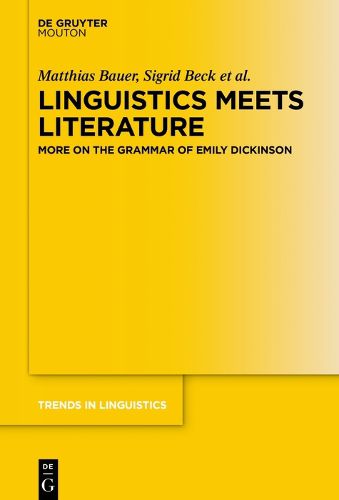Readings Newsletter
Become a Readings Member to make your shopping experience even easier.
Sign in or sign up for free!
You’re not far away from qualifying for FREE standard shipping within Australia
You’ve qualified for FREE standard shipping within Australia
The cart is loading…






Until recently, collaborative efforts between formal linguistics and literary studies have been relatively sparse; this book is an attempt to bridge this gap and add to the hitherto small pool of studies that combine the two disciplines. Our study concentrates on Emily Dickinson’s poetry, since it displays a highly uncommon and therefore challenging use of language. We argue this to be part of her poetic strategy and consider Dickinson an intuitive linguist: her apparent non-compliance with linguistic rules is a productive exploration of linguistic expression to reveal the flexibility and potential of grammar, leading to complex processes of interpretation. Our study includes a number of in-depth analyses of individual poems, which combine formal linguistic methods and literary scholarship and focus on specific aspects such as ambiguity, reference, and presuppositions. One of our findings concerns the dynamic interpretation of lyrical texts in which the pragmatic step of establishing what a poem means for the reader is postponed to text level. We provide readers with a tool-box of methods for the formal linguistic analysis not just of Emily Dickinson’s poetry but of linguistically complex literary texts in general.
$9.00 standard shipping within Australia
FREE standard shipping within Australia for orders over $100.00
Express & International shipping calculated at checkout
Until recently, collaborative efforts between formal linguistics and literary studies have been relatively sparse; this book is an attempt to bridge this gap and add to the hitherto small pool of studies that combine the two disciplines. Our study concentrates on Emily Dickinson’s poetry, since it displays a highly uncommon and therefore challenging use of language. We argue this to be part of her poetic strategy and consider Dickinson an intuitive linguist: her apparent non-compliance with linguistic rules is a productive exploration of linguistic expression to reveal the flexibility and potential of grammar, leading to complex processes of interpretation. Our study includes a number of in-depth analyses of individual poems, which combine formal linguistic methods and literary scholarship and focus on specific aspects such as ambiguity, reference, and presuppositions. One of our findings concerns the dynamic interpretation of lyrical texts in which the pragmatic step of establishing what a poem means for the reader is postponed to text level. We provide readers with a tool-box of methods for the formal linguistic analysis not just of Emily Dickinson’s poetry but of linguistically complex literary texts in general.